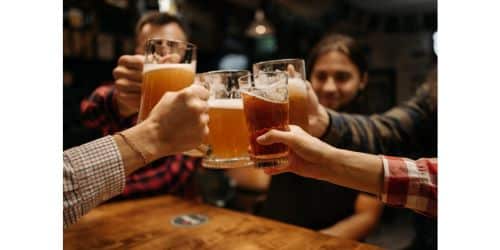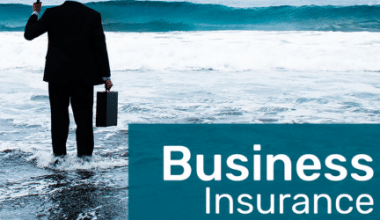Running a bar can be an interesting enterprise because it allows you to create a lively atmosphere while also serving excellent drinks to customers. However, in the midst of the rush and bustle, it’s important to realize that unforeseen incidents can occur, jeopardizing your business and financial stability. This is where bar insurance comes in. In this comprehensive guide, we will go over the basics of bar insurance, such as its importance, cost factors, specialist alternatives like wine bar insurance and mobile bar insurance, and advice for obtaining the best coverage for your business.
What is Bar Insurance?
Bar insurance, often known as liquor liability insurance or bar and tavern insurance, is a type of coverage specifically designed to protect facilities that offer alcoholic beverages. It protects you financially against responsibilities resulting from mishaps or accidents on your property, such as injuries, property damage, or alcohol-related situations.
The Importance of Bar Insurance
Bar insurance is not just required by law in many jurisdictions; it is also an important risk management tool for bar operators. Because of the nature of the bar industry, which involves alcohol consumption and potential hazards, it is vulnerable to a variety of risks. Also, Bar insurance protects your business and helps limit financial damages caused by unforeseen incidents, thereby preserving both your reputation and your bottom line.
Bar Insurance Coverage Options
- Liquor Liability Insurance: The core component of bar insurance is liquor liability insurance. It covers bodily injury, property damage, and other liabilities that may arise from the sale or service of alcoholic beverages. This coverage is crucial since bars can be held liable for inebriated guests’ damages, such as accidents, fights, or alcohol-related occurrences.
- General Liability Insurance: Bars should get general liability insurance in addition to liquor liability insurance. Non-alcohol-related claims, such as slip-and-fall accidents, property damage, or advertising injuries, are covered under this policy. General liability insurance covers your bar’s operations more broadly.
- Property Insurance: Property insurance is essential for bars since it covers damage or loss to your establishment’s physical assets, such as the building, furnishings, equipment, and inventory. It protects against risks including fire, theft, vandalism, and natural disasters, ensuring that your bar can recover and restart operations in the event of a crisis.
- Workers’ Compensation Insurance: Protecting your staff is critical as a bar owner. Workers’ compensation insurance covers medical expenses, disability payouts, and lost income resulting from workplace injuries or illnesses. It helps to create a safe and secure work environment for your employees and is frequently required by law.
- Business Interruption Insurance: Business interruption insurance is intended to replace lost income and ongoing expenses if your bar is forced to close due to a covered incident, such as a fire, flood, or other damage. It might help you bridge the financial gap during the recovery time and keep your firm running.
Bar Insurance Cost
The cost of bar insurance might vary depending on various factors. These factors include the location of your bar, its size and type, the number of employees, your claims history, and the coverage limits and deductibles you select. Insurance providers assess these factors to determine the level of risk associated with your bar, which influences the premium you pay.
- Location and Jurisdiction: The location of your bar influences insurance costs significantly. Premiums may be higher in urban areas with higher crime rates or in areas prone to natural disasters. Furthermore, insurance rules and liquor liability laws differ from jurisdiction to jurisdiction, influencing coverage requirements and costs.
- Size and Type of Establishment: The size and type of bar you own can have an impact on your insurance costs. Factors such as your establishment’s capacity, the presence of live entertainment, or additional amenities such as outdoor seating or dance floors can all raise the perceived risk and, as a result, the insurance premium.
- Claims History: Insurance companies look at your bar’s claims history to determine the level of risk associated with your operation. Premiums may be raised if you have a history of frequent or high-value claims. Maintaining a clean claims record, on the other hand, can help keep insurance costs under control.
- Coverage Limits and Deductibles: The coverage limits you select for your bar insurance policy will have a direct impact on the cost. larger coverage limits offer more complete protection but at a larger cost. Similarly, the deductible you choose—the amount you must pay out of pocket before insurance coverage kicks in—influences the premium. In general, higher deductibles result in lower premiums.
Finding the Best Bar Insurance
- Assess Your Bar’s Needs: The best bar insurance coverage begins with an assessment of your specific needs. Take into account the size of your establishment, the type of bar you run, the location, and any unique risks associated with your business. This assessment will assist you in determining the appropriate coverage types and limits required to adequately protect your bar.
- Shop Around for Quotes: Once you’ve determined your insurance requirements, it’s critical to shop around for quotes from various insurance companies. Examine the coverage options, policy terms, and premiums provided by various insurers. This allows you to make an informed decision and find the best balance between coverage and cost.
- Evaluate Insurance Providers: When choosing an insurance provider, consider factors beyond just the price. Look for insurers with a strong reputation, financial stability, and a history of prompt and fair claims handling. Customer reviews and recommendations can provide valuable insights into the quality of service offered by insurance companies.
- Seek Professional Advice: Navigating the complexities of bar insurance can be overwhelming. Consider consulting with insurance experts who specialize in the hospitality industry. Insurance brokers or agents who specialize in bar insurance can assist you in understanding your coverage options, accurately assessing your risks, and finding tailored solutions for your specific bar business.
- Review and Update Regularly: Once you have bar insurance in place, it is critical to review and update your coverage regularly. As your business evolves, your insurance needs may change. Periodically examine your coverage to ensure it corresponds with your actual activities, risks, and industry standards.
Wine Bar Insurance
If you own or run a wine bar, you realize the specific risks and challenges connected with providing good wines to a discerning clientele. Wine bar insurance provides specialist coverage suited to the specific demands of your operation. In addition to the normal liquor liability and general liability coverage, wine bar insurance gives additional protection for the special risks wine bars face.
One major feature of wine bar insurance is coverage for valuable wine collections. As a wine bar owner, you likely invest in a selected range of rare and expensive wines. In the event of theft, damage, or spoilage, wine bar insurance can provide coverage to help you recover the financial loss. This coverage is crucial in safeguarding your investment and ensuring that your wine bar can continue to offer an exceptional selection to your customers.
Moreover, wine bar insurance may give coverage for specific equipment used in wine service, such as temperature-controlled storage units, wine dispensing systems, and decanting tools. These tools are vital for ensuring the quality and character of the wines you offer. If they are destroyed or stolen, the expense of replacement or repair might be enormous. Wine bar insurance can assist in offsetting these expenses and guarantee that your activities continue successfully.
When picking wine bar insurance, it’s crucial to engage with an insurance provider that understands the special risks and needs of the wine industry. Look for insurers who have experience in insuring wine bars and a comprehensive understanding of the wine industry’s particular challenges. They may create a policy that is tailored to your individual needs, ensuring that you have comprehensive coverage that covers the nuances of your wine bar.
Mobile Bar Insurance
Mobile bars, such as food trucks or pop-up bars, have gained popularity in recent years. These mobile companies present new obstacles and risks, necessitating specific insurance coverage. Mobile bar insurance covers the specific responsibilities connected with operating in various locations and providing alcohol at various events or festivals.
Liability coverage for mishaps that may occur while in transit is an important part of mobile bar insurance. As a mobile bar owner, you must frequently transfer equipment such as bar counters, kegs, and glassware to various locations. In the case of an accident or damage while traveling, mobile bar insurance can cover the expense of repairs or replacements, allowing your business to keep running smoothly.
Furthermore, mobile bar insurance often includes liquor liability coverage, which protects you from claims originating from alcohol-related mishaps during events or festivals. Whether it’s a drunken customer or a case when alcohol consumption causes property damage or bodily injury, this coverage provides financial security and peace of mind.
Consider the various events or festivals you intend to attend while choosing mobile bar insurance. Some insurance may provide coverage for specific types of events or have attendance limits. Check that the insurance you select is compatible with your business model and provides appropriate coverage for the events you intend to cater.
In addition, mobile bar insurance may cover equipment breakdown or spoilage. Because mobile bars are portable, equipment failures or power outages might occur, resulting in financial losses. You can protect yourself from these unforeseen events and limit the damage to your business with the correct coverage.
Bar Insurance Cost-Saving Tips
- Risk Management Practices: Implementing good risk management techniques can help reduce the incidence of events and claims, perhaps leading to cheaper insurance costs. Maintain a safe and sanitary atmosphere, train your staff on responsible alcohol serving, and have suitable security measures in place to reduce dangers.
- Bundle Coverage Policies: Consider bundling different coverage types with the same insurance provider, such as liquor liability insurance, general liability insurance, and property insurance. Bundled policies are frequently offered discounts or lower premiums by insurers, resulting in cost savings for your bar insurance.
- Increase Deductibles: Opting for higher deductibles can lower your insurance premiums. However, carefully consider your financial capabilities to ensure that you can comfortably afford the deductible amount if a claim is filed.
- Maintain a Safe Claims History: A clean claims history shows insurance providers that your bar is run responsibly and has a low risk of incidents. You may be able to qualify for lower premiums or discounts on your bar insurance if you minimize claims.
- Regularly Review and Compare Quotes: Bar insurance is a volatile market, and rates can fluctuate. Regularly reviewing your insurance coverage and obtaining quotes from various insurers ensures you are getting the best coverage at the best price.
What is the difference between general liability and liquor liability?
General Liability insurance is a set of policies designed to protect your company from third-party bodily injury and property damage claims. While Liquor Liability insurance protects your company against the costs of liquor-related claims.
What is the difference between dram shop insurance and liquor liability insurance?
While dram shop liability covers claims arising from both the sale and free distribution of alcohol, liquor liability insurance only covers liabilities arising from alcohol-related accidents when you are not in the business of selling alcohol.
Does Progressive have liquor liability?
Yes, as part of its commercial insurance offerings, Progressive provides liquor liability insurance. Liquor liability insurance is intended to protect businesses that serve or sell alcoholic beverages from potential liabilities resulting from inebriated customers’ actions. It typically covers bodily injury, property damage, or personal injury claims caused by an inebriated individual who was served alcohol by the insured business.
Why do bars make you pay cover?
Bars often charge a cover fee to generate revenue and cover various expenses associated with operating the establishment. There are several reasons why bars choose to implement cover charges:
- Entertainment Costs
- Operational Costs
- Crowd Control
- Premium Experience
- Special Events or Promotions
It’s crucial to note that cover costs are not universal and might vary depending on the location, style of bar, day of the week, or individual event. Some bars may choose not to impose a cover fee and instead rely on other revenue streams, such as beer sales or food service. Ultimately, the choice to establish a cover charge depends on the business model, target demographic, and operational demands of the bar.
What does Dram Shop liability insurance protect?
Dram shop liability insurance is a type of insurance coverage that protects companies, such as bars, restaurants, and taverns, from potential liabilities stemming from the service or sale of alcoholic beverages. It specifically covers claims connected to injuries or damages caused by individuals who became intoxicated as a result of being served alcohol by the insured institution.
When should you consider Dram Shop liability insurance?
Dram shop coverage is needed if you create, sell, or serve alcohol, even if you’re not obligated by dram shop legislation. It protects you from having to pay out of cash if one of your clients injures herself or others or causes property damage.
Why is liquor liability insurance important?
Businesses that sell, serve, or distribute alcohol can benefit from liquor liability insurance. This sort of business insurance can help cover claims for bodily injury or property damage caused by an inebriated consumer after a business provides them with alcohol.
Conclusion
Bar insurance is a must-have for any establishment that serves alcoholic beverages. It covers your bar from financial responsibilities, preserves your assets, and ensures that your business can withstand unexpected events. You may get the best bar insurance coverage that suits your needs and budget by researching the various coverage options available, including specialty insurance for wine bars and mobile bars, and considering cost-saving techniques.
Remember that running a successful bar entails more than just selling drinks; it also necessitates meticulous risk management and protection. So, with comprehensive bar insurance coverage, take the required precautions to ensure your bar’s future.
- MOBILE HOME INSURANCE: HOW DOES IT WORK?
- LIQUOR LIABILITY INSURANCE: A Comprehensive Guide for Businesses
- DRAM SHOP INSURANCE: A Comprehensive Guide for Businesses
- HOW TO SAVE MONEY CAR INSURANCE: Proven Tips & Steps
- Ohio Small Business Health Insurance: Complete Guide
- ENGINEER PROFESSIONAL LIABILITY INSURANCE: 2023 Guide






